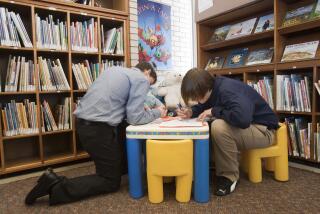Is ‘Progress’ Worth the Sacrifice of Children?
- Share via
Your dispatch (Aug. 16) on Japanese “cram schools” was interesting and also significant when viewed in the light of historical perspective.
Anthropologists inform us that the offspring of our Paleolithic ancestors enjoyed carefree childhood, as do those of their contemporary counterparts (Bushmen, Australian aborigines, etc.). With the advent of agriculture, children were required to look after livestock and to do assorted farm chores.
By the time of the ancient civilizations, we find an Egyptian father urging his son to study hard in order to avoid the fate of a metal worker “with fingers like a crocodile’s,” of a stone mason whose “knees and spine are broken,” and of a farmer whose “bed is the bare earth in the middle of his beasts.” So the young student in the Egypt of 4,000 years ago was warned that diligence in school would mean “gain for eternity.”
This pattern of decreasing childhood and increasing pressure to compete and surpass has reached its acme in the country that leads the world in economic dynamism and growth.
Your Tokyo correspondent, Sam Jameson, notes that inflicting “examination hell” on Japanese youngsters, and pressuring them to cram for months on five hours of sleep a night, “has helped to make this country an economic powerhouse.”
Before we are called upon to follow the Japanese example, in order to compete in the global GNP Olympics, it might be wise to hold back and reflect. Is it worth the price?
In the recent Tokyo conference of the major economic powers, the major problem appears to have been the global glut of both industrial and agricultural products.
So why should we pressure our children to work harder in order to produce more? Judging from the past record, it will not alleviate poverty and hunger for the majority of the human race in the Third World, or for that matter, in our own country. Rather, the end result is likely to be more environmental degradation, more resource depletion, and more whirling dervish consumerism, which leaves us less and less time to buy the products that we have been persuaded we need.
Is this “progress” worth the sacrifice of children, not to mention the adults on whom they must depend?
L.S. STAVRIANOS
La Jolla
More to Read
Sign up for Essential California
The most important California stories and recommendations in your inbox every morning.
You may occasionally receive promotional content from the Los Angeles Times.












